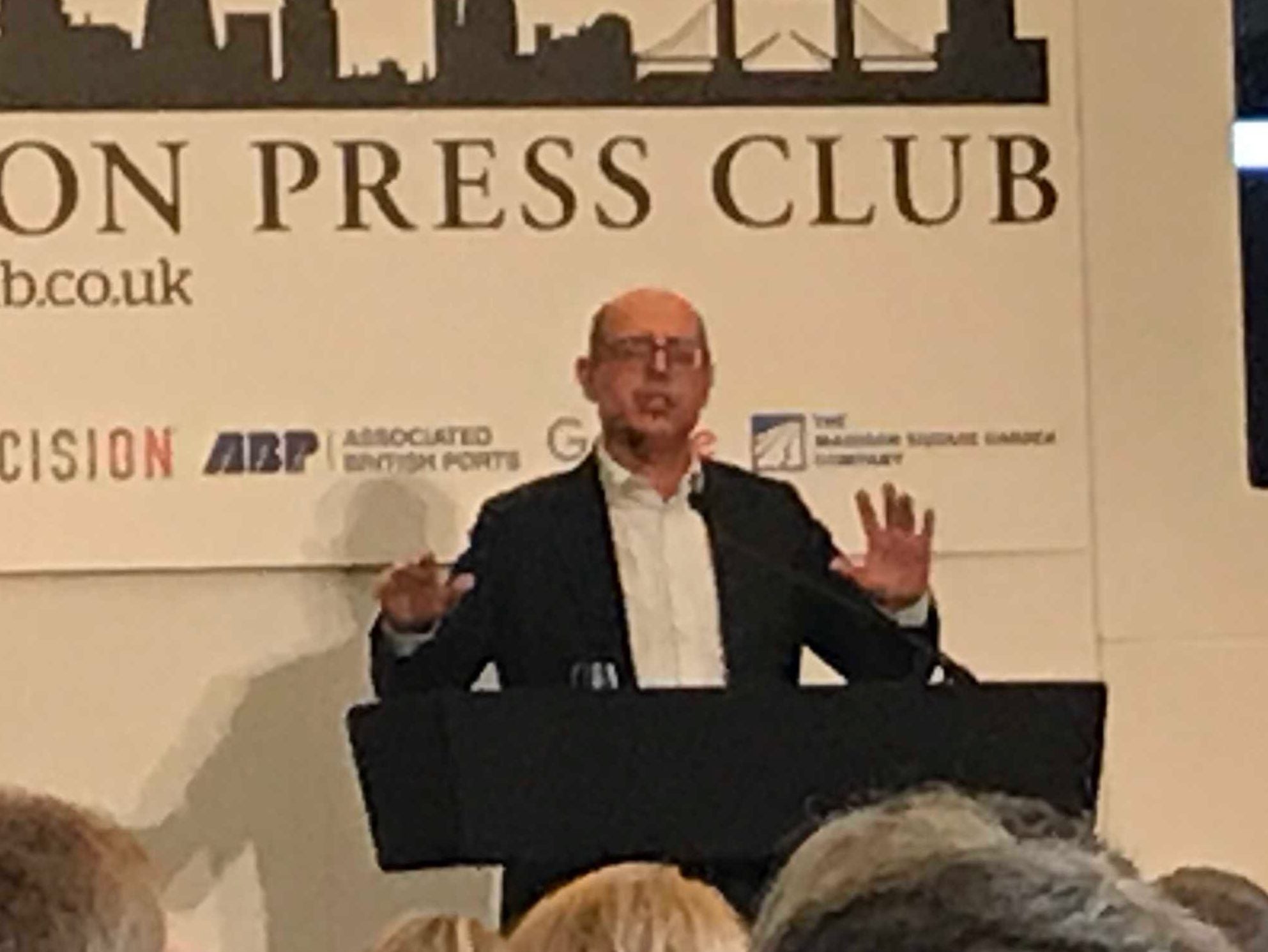
Nick Robinson has spoken out in defence of the BBC, which has been lately rounded on by sections of the press, and labelled Russian-backed broadcaster RT a “propaganda” channel and a “threat”.
The Today programme presenter offered a riposte to former Daily Mail editor Paul Dacre in delivering the keynote speech at today’s London Press Club Awards, which named Sir David Attenborough its Londoner of the Year.
BBC News political editor Laura Kuenssberg and Europe editor Katya Adler also jointly collected the Broadcast Journalist of the Year prize.
Scroll down for full list of winners
Robinson described as “tosh” a claim by Dacre, made in a speech at October’s Press Club Ball, that newspapers “still set the news agenda for a BBC that still plunders our journalism while missing no opportunity to denigrate the press”.
BBC News has also been recently criticised by Lloyd Embley, editor-in-chief of Mirror, Express and Star publisher Reach, and David Dinsmore, chief operating officer at Sun and Times publisher News UK, over its remit.
Said Robinson: “On the one hand broadcasters do depend on you [the press], we follow your stories and campaigns, we sometimes shamelessly lift them without credit – and if I could apologise on behalf of BBC News for the phrase ‘BBC understands’ I would like to do it.
“But let’s hear the other side – you depend on us. You lift our interviews, you follow our agenda at times. The truth is it’s a symbiotic relationship. We need each other.”
Robinson said the relationship between broadcasters and the written press was sometimes “love-hate” and sometimes a “healthy competitive rivalry”, but he said Dacre had been “not just wrong but dangerously wrong at a dangerous time” when “proper journalism” is under assault.
As well as threats to journalists abroad in regions “who want to silence them”, Robinson said they had been “abused and attacked at home by partisans” who take what they don’t like to hear as “evidence of bias or proof that you are really the enemy”.
The BBC’s former political editor said news stories were being “plundered… not by the BBC, not by broadcast media, but by Facebook, who publish everything and pay almost nothing”.
He went on: “The real enemy… [is] not the press, or the BBC, or the broadcasters, though you are entitled to be resentful of the BBC’s size, its ambition and the fact we have a guaranteed income… the real enemy is people who don’t believe in investing in journalism, who don’t believe in facts, in debate, in clear heads.
“We are, to coin another phrase used by the current editor of the [Evening] Standard: ‘All in it together.’.”
Robinson also warned that it was “dangerously complacent” to think that while politics is changing, nothing will change in the media, pointing to three things that threaten it:
- “Brexit fever”
- “People trying to hack our national debate”
- And the “Fox-ification of our broadcast media”.
On the first he said Brexit fever had “led to reporting which is either shrilly partisan” or “lazily suggestive of a pernicious idea: that you can’t really believe any of it at all so you might as well rely on your own prejudices”.
He added: “The media – not just politicians – have a responsibility to take care over the language they use. Caricaturing leavers as ill-educated, working class, casually racist Northerners is unacceptable.
“So too is labelling Remainers as mutineers, saboteurs, traitors or printing articles by politicians who seem not to have noticed that the Second World War ended a while back.”
Taking aim at RT, formerly Russia Today, he said the Russian state-backed channel, which he said is ahead of the BBC on Facebook and Twitter, “isn’t journalism” but “propaganda”, adding: “It’s a threat and it’s a threat that we should take very seriously.”
He also questioned whether allowing “full-time politician” Nigel Farage to return to host his own radio show on LBC following the European Parliamentary elections, in which he is standing, is “really broadcast impartiality”. He said this change in the basis of British broadcasting was taking place without a debate in Parliament or a review by regulator Ofcom.
Speaking earlier in the evening in accepting his Londoner of the Year Award, Attenborough said one of his first jobs had been as a scientific editor of the University of London Press, which he left for a role in television at the BBC in Alexandra Palace, when the medium was still in its infancy.
“I was right at the birth of British television – come to think of it world television – and it was perhaps the luckiest thing of my professional life to have been there just at the beginning and to see how television has transformed the world…”
“I thought it was the most exciting thing I had ever done,” he added. “The fizz and excitement – everything was live.” He said at that time that the BBC could only broadcast as far as North London and praised new streaming technology for its ability to reach the whole world at once.
Attending today’s lunch event at Stationer’s Hall, central London, were the editors of the Times, Sunday Times, Daily Mirror and Observer.
London Press Club Award winners 2019
Business Journalist of the Year – Madison Marriage, FT
Broadcast Journalist of the Year – Laura Kuenssberg and Katya Adler, BBC News
Digital Journalist of the Year – Bellingcat
Print Journalist of the Year – Amelia Gentleman, Guardian
Scoop of the Year – Cambridge Analytica, Observer
Edgar Wallace Trophy – Ian Jack, Guardian
Email pged@pressgazette.co.uk to point out mistakes, provide story tips or send in a letter for publication on our "Letters Page" blog
